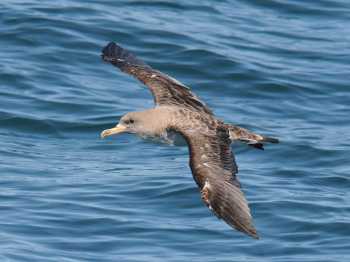María Mateos-Rodríguez (Biology Department, University of Cádiz, Spain) and Bruno Bruderer (Swiss Ornithological Institute, Sempach, Switzerland), writing in the Journal of Ornithology, have used radar to measure the flight speeds of Balearic Puffinus mauretanicus and Cory's Calonectris diomedea Shearwaters.
The paper's abstract follows:
"Wind is an important selective agent in bird migration. In this study, we investigated the influence of wind on the air speed of pelagic seabirds in the Strait of Gibraltar by means of radar measurements. The birds were identified visually at the species level. A total of 354 radar tracks of migrating birds were analysed, with an average tracking time of 147 s per target. An interspecific comparison under negligible wind speeds showed a slight increase of air speed in the order from Cory's Shearwater, a typically gliding species (12.8 m s-1), Balearic Shearwater (gliding with flapping, 14.7 m s-1), gannets (flap-gliding, 15.0 m s-1), Great Skua (flapping, 16.0 m s-1) to auks (fast flapping, 17.4 m s-1). All of the studied species decreased their air speed with increasing wind increment (ground speed minus air speed), and this occurred in following winds slightly less than in opposing winds. Auks adjusted air speed to wind increment only in opposing winds, suggesting that auks are not able to reduce their high air speed in following winds due to extremely high wing loading."

Cory's Shearwater. Photograph by John Graham
Reference:
Mateos-Rodríguez, M. & Bruderer, B. 2012. Flight speeds of migrating seabirds in the Strait of Gibraltar and their relation to wind. Journal of Ornithology DOI: 10.1007/s10336-012-0814-6.
John Cooper, ACAP Information Officer 7 April 2012

 Français
Français  English
English  Español
Español